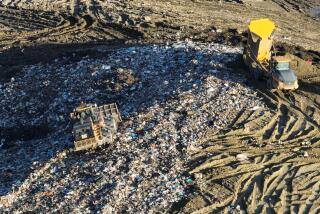Companies Race to Find a Use for Rug Waste : Recycle: In Georgiaâs carpet-making region, most of the scrap and other residue ends up in landfills--but with research, that may change.
DALTON, Ga. â In northwest Georgia, where most of the nationâs carpet is made, there are tons of scrap, lint and other residue that just canât be swept under the rug.
Most of it ends up in the Dalton-Whitfield County landfill, where piles of carpet waste stand two stories above ground level.
The threat of overflowing landfills and costly disposal fees charged to manufacturers--plus a strong belief that thereâs money to be made--has sparked a race by several carpet and chemical companies to find a way to recycle the waste.
Efforts so far have not produced a product ready for the commercial market. One problem: how to economically get the bulky material from disposal points to recycling plants.
âThere are substantial dollars being spent at various levels of the industry to rid the landfills and . . . to create profit,â said Peter R. Spirer, a former carpet executive.
Spirer now heads Horizon Pacific Ltd., an Atlanta-based company developing a process to turn carpet waste into industrial panel board.
Carpet waste amounts to about 2% of the nationâs total landfill volume, according to some industry estimates. And waste from carpet manufacturing is compounded by carpet that is discarded when homes and offices replace their floor coverings.
âItâs a two-headed monster,â said Reg Burnett, a carpet industry consultant.
Mack Belue, manager of the Dalton landfill, says the facility is in no immediate danger of filling up, despite taking in about 50,000 tons a year from the areaâs carpet plants.
*
Nevertheless, Spirer says the industry can head off a potential environmental predicament, and mine profits, by acting now.
âMost of the carpet mills, to say nothing of some outside entrepreneurs that are looking at it purely from a profitability standpoint, are saying, âGee, that stuff should have properties that are usable if we could only get our hands on the waste and find a way to create new products,â â he said.
Also contributing to the industryâs enthusiasm is the fact that many companies are having to pay steep fees to dump the waste in landfills. Dalton, for example, began charging a fee in 1989 that now totals $30 a ton.
âTheyâve got to be looking at it and saying, âWeâre paying those folks a lot of money,â â Belue said.
*
Ironically, carpet waste accumulating in landfills has gotten scant attention from environmental groups, aside from their opposition to the industryâs efforts to establish waste incinerators.
Some, like Spirer, are pushing forward with their recycling efforts regardless of the lack of attention.
Spirer founded Horizon Pacific after the carpet company he founded, Horizon Industries Inc., was acquired by Mohawk Industries Inc. in 1992. He has been working with a German machinery company, Eduard Kusters Maschinenfabrik, to perfect a recycling system for carpet waste.
The multimillion-dollar venture has produced a panel board intended as an alternative to plywood. The project is in its final stages, Spirer says, though the finished product, called Tibor, has shown some limitations.
*
Because it is more malleable than wood, the recycled material could not be used for walls. It is, however, ideal for floors and other uses, Spirer says.
Several large chemical companies that make materials for carpet manufacturers also are working on developing products from recycled material.
St. Louis-based Monsanto Co., for example, is experimenting with creating a plastic-like substance from old carpet that could be used for automobile engine parts.
âWeâre in the process of trying to commercialize it now,â said Jerry Dickerson, a technology manager at Monsantoâs Pensacola, Fla., plant. âWeâve got samples in the auto industry for review.â
Several carpet mills are also engaged in recycling research, consultant Burnett says. One example is Dalton-based Shaw Industries Inc., the worldâs largest carpet company. Shaw officials declined requests to be interviewed on the topic.
More to Read
Inside the business of entertainment
The Wide Shot brings you news, analysis and insights on everything from streaming wars to production â and what it all means for the future.
You may occasionally receive promotional content from the Los Angeles Times.










